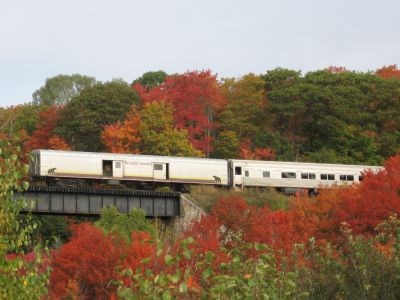Another summer like 2015 could spell the end for lodge owner Andrei Spazier.
A year that began so promising turned into one to forget for the proprietor of Woods Cabins, located on Oba Lake at Mile 212 of the Algoma Central Railway.
CN Rail pulled the plug on the Sault Ste. Marie-to-Hearst passenger service in mid-July after their handpicked third-party operator, Michigan’s Railmark Holdings, fell woefully short in servicing and financing the 470-kilometre line.
“Quite a bad season for sure,” said Spazier, who conservatively estimates business was down 20 to 30 per cent from past years. “It was shaping up to be one of our best seasons. We were booked up solidly for the whole summer and once this happened it sort of went downhill.”
With no roads leading into his remote fishing lodge, and almost all of their clients arriving and departing by train, Spazier was forced to contact all his incoming guests to advise them the only way in was by float plane.
“We did lose some people that didn’t want to fly for various reasons.”
And with no train service running from mid-July to September, the number of late-season bookings dried up once word got out.
“It’s hard to put an exact number (to categorize the impact) because we don’t know how many people we lost because the number of inquiries we had was down to nothing.”
Equally as painful was the service offered by Railmark. The train schedule went out the window, said Spazier.
“Totally unreliable. We had no idea if it was going to come. From our point of view, it was a disaster.”
One morning in June, about a month before CN cancelled service, Spazier had 40 departing guests impatiently waiting track-side for a train that never came.
“People were getting quite tired sitting in the sun, and we had people with medical conditions that needed to go home.”
A contact in Hawk Junction eventually got word to him by afternoon.
Spazier had to hurriedly make same-day arrangements with a local float plane operator to airlift his guests out.
His calls, emails and texts of complaint to Railmark CEO Allen Brown went unanswered.
“We had no clue if the train was coming or not,” said Spazier. “We always had to have a Plan B.”
With CN and a local stakeholders group now searching for its second operator in less than a year, Spazier holds some degree of confidence that a suitable replacement for Railmark will be selected.
The deadline for proponents to make submissions was Sept. 9. The successful bidder was expected to be announced in October. Waiting for the approved operator will be a three-year, $5-million federal subsidy.
“I hopefully everything works out with the new operator,” said Spazier. “The (government) money is there, the train and tracks do exist, we just need someone to do it.”
Experiencing another summer with no passenger service could spell the end, he added.
“I think it would be very questionable that we could survive if there was no train.”
Linda Savory-Gordon, co-chair of the Coalition of Algoma Passengers Trains, said the cancellation of the passenger train only underscores how vital the service is to tourism operators, outfitters and cottagers.
Savory-Gordon said clients accessing the more high-end lodges can afford to fly, but the more rustic outpost camps and smaller lodges, where guests must bring their own groceries and gas for boats, are often more inconvenienced and lose business.
Trappers are unable to reach their trap lines and one resident along the line relies on the train to bring his medication, she said.
Her coalition is appealing to CN for a special winterization train to run after Thanksgiving to allow property owners to seal up their camps for the season.
“We’re hoping for a good-will gesture on their part.”
A BDO Canada report of the train in 2014 prepared for the Algoma Central Passenger Service Working Group placed the annual economic impact of the train to the area as being between $38.1 million and $48.1 million.
The report also indicated that since 2005, ridership has been steadily declined from a high of 12,640 that year to a low of 5,166 in 2013.
For Shaun Parent, owner of Superior Exploration Adventure and Climbing Company, the train service was the only way his clients can access Agawa Canyon, unless he accompanies them into the remote spot by snowmobile.
Since 1985, he’s brought more than 3,000 climbers into the area and estimates 60 climbers rode the rails last year to reach the prime climbing spots in the canyon.
A staunch advocate of passenger rail, Parent was keen on Railmark’s and Brown’s plan to promote his climbing excursions. “He saw the potential, because that’s the only reason people went into the canyon in the wintertime, was to ice climb.”
Parent believes promoting available activities in the area – like river kayaking and rafting, skiing, snowshoeing, mountain biking and hiking – can drive more traffic onto the coaches and extend overnight stays. “So, Agawa Canyon, rather than just sightsee, there’s a reason to go there. There are adventures to do.”




